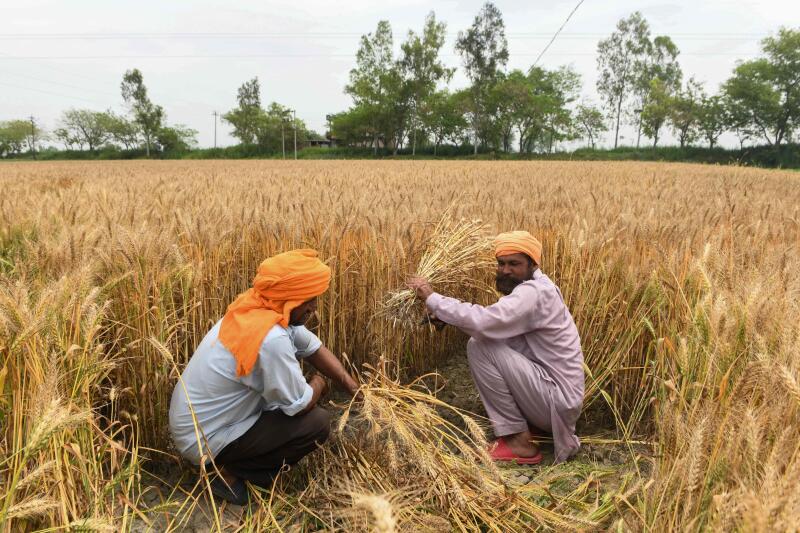Coronavirus: India, Pakistan seek to lift some curbs to help millions hit by lockdowns
Sign up now: Get ST's newsletters delivered to your inbox

Farmers harvest wheat crops in a field on the outskirts of Amritsar on April 13, 2020.
PHOTO: AFP
Follow topic:
NEW DELHI/ISLAMABAD (REUTERS) - India will allow industries located in the countryside to reopen next week, as well as resume farm activities to reduce the pain for millions of people hit by a lengthy shutdown in its coronavirus battle, the government said on Wednesday (April 15).
Prime Minister Narendra Modi ordered the population of 1.3 billion to stay indoors for 19 days more after a strict three-week lockdown, saying it was critical to save lives amid the pandemic.
But he said he felt the pain of the poor and on Wednesday, the home (interior) ministry released guidelines allowing limited resumption of commerce and industry in the hinterland, less affected by the pandemic.
"To mitigate hardship to the public, select additional activities have been allowed, which will come into effect from April 20," it said.
Millions of people have been thrown out of work across South Asia since lockdowns began last month, and growing anger in some areas was reflected in the Indian commercial capital of Mumbai on Tuesday, when hundreds mobbed a train station demanding transport home.
Neighbouring Pakistan, which also announced a two-week extension to its shutdown to halt the virus, said it would reopen construction activity that provides a lifeline for the largest number of its people after agriculture.
Export industries, such as garments, will also be permitted to begin production, said Industries Minister Hammad Azhar, adding that the government had made an assessment of the sectors least vulnerable to infection.
"The low-risk industries, meaning where there is less danger of the epidemic's spread as compared to others, they were identified," he said.
India has 11,439 infections, government data showed on Wednesday, a jump of 1,076 from the previous day. These include 377 dead. Pakistan's caseload is 5,988, including 107 deaths.
Health experts fear the small numbers relative to some Western nations are a result of low levels of testing in the region and that actual infections could be far higher.
Widespread contagion could be disastrous for the millions living in dense slums in South Asia, where health services are overstretched.
India, the region's biggest economy, has one doctor for every 1,500 citizens, short of the ratio of one for every 1,000 recommended by the World Health Organisation. In some rural areas, the ratio is one doctor to 10,000 people.
"We had no choice but to extend the lockdown, but we are trying to protect livelihoods," said Mr Arvind Kejriwal, the chief minister of Delhi, which, along with Mumbai, accounts for more than a third of cases.
In Dhaka, the capital of Bangladesh, hundreds of workers defied a government lockdown to take to the streets demanding wages.
"We have not received wages for the last two months," said one of them, Sahana Begum. "Now we don't have any food at home. We are dying from starvation."
Bangladesh has 803 cases, including 39 deaths.
The second-largest apparel producer after China, Bangladesh is set to lose export revenue of about US$6 billion (S$8.5 billion) this fiscal year, hit by cancellations from some of the world's largest brands and retailers, two industry bodies said last month.

